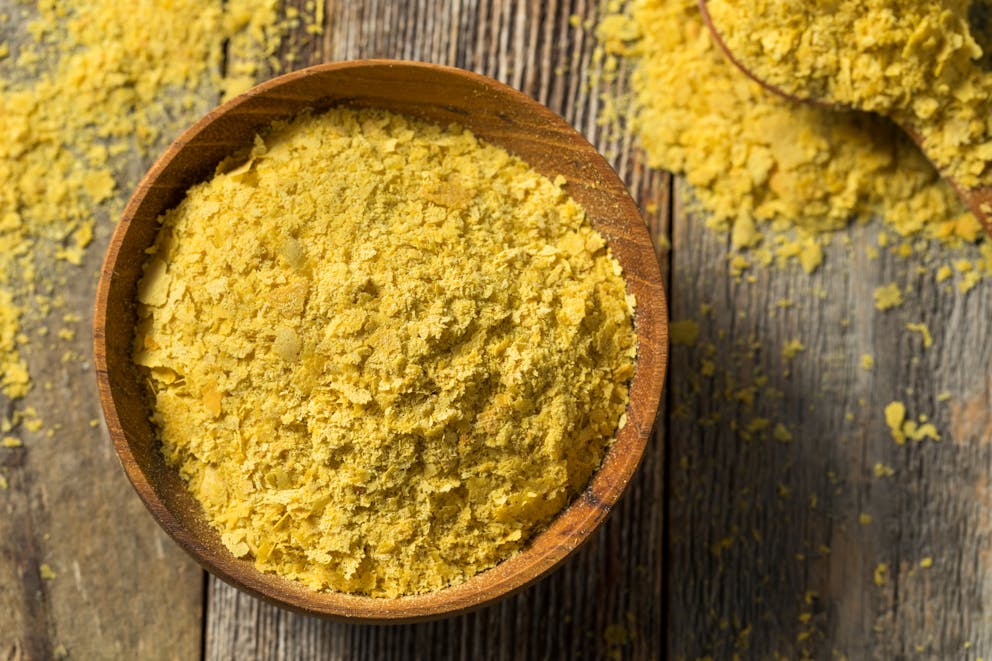8 Ways to Use Nutritional Yeast in Your Diet
Nutritional yeast has become a beloved ingredient in my kitchen. This golden, flaky powder is a nutritional powerhouse and adds a delicious cheesy flavor to many dishes.
Since I started incorporating nutritional yeast into my diet, I've experienced numerous benefits firsthand.
When I first discovered nutritional yeast, I was looking for dairy-free alternatives. I had no idea that I was about to discover a nutrient-packed ingredient that would become a part of my daily diet.
From boosting the immune system to enhancing heart health, the benefits of nutritional yeast extend far beyond its delicious taste. Let's discover why this ingredient is a must-have in your pantry and how it can revolutionize your healthy eating habits.
What Is Nutritional Yeast?
Before we explore the many benefits of nutritional yeast, let's break down what it is. Nutritional yeast, often referred to as "nooch" by its fans, is a deactivated form of Saccharomyces cerevisiae, a type of yeast.
Unlike the active yeasts used in baking, nutritional yeast undergoes a process of heat treatment and drying. This process makes it inactive and gives it its distinctive nutty, cheesy flavor and flaky texture.
It’s important to note that nutritional yeast differs from other yeast varieties, such as brewer's yeast or baker's yeast. While they all originate from the same species, their processing and uses are distinct.
Nutritional yeast is specifically cultivated as a food product. Its primary purpose is to be rich in vitamins and minerals.
The Nutritional Profile of Nutritional Yeast
One of the most remarkable aspects of nutritional yeast is its nutrient density. Just a single serving (about 2 tablespoons) provides an array of essential nutrients:
8-10 grams of complete protein.
3-4 grams of fiber.
B-complex vitamins (including B1, B2, B3, B6, and often B12).
Trace minerals like zinc, selenium, and manganese.
Antioxidants like glutathione.
This impressive nutritional profile makes nutritional yeast a valuable addition to any diet. It is an excellent choice for individuals following plant-based or vegan diets.
This is because it is a source of high-quality protein and contains all nine essential amino acids, which can be a challenge to obtain solely from plants.
Top Nutritional Yeast Benefits for Your Health
Now that we've clarified what nutritional yeast is, let's dive into its amazing health benefits. From strengthening your immune system to promoting heart health, nutritional yeast is a true superfood with many advantages.
1. Supports Immune Function
One of the most notable nutritional yeast benefits is its ability to support immune function. Beta-glucans, naturally present in nutritional yeast, have been shown to have immune-stimulating effects.
These complex sugars act by activating immune cells. These cells include macrophages and natural killer cells, which play a vital role in defending our bodies against harmful pathogens.
I’ve found that adding nutritional yeast into my diet, particularly during cold and flu season, has significantly benefited my overall health.
While I don’t believe it’s a cure-all, I've experienced quicker recovery from minor illnesses since incorporating nutritional yeast into my regular diet.
2. Boosts Energy and Reduces Fatigue
Nutritional yeast is an excellent source of B-complex vitamins. These vitamins are essential for energy metabolism. For example, vitamin B12 plays a vital role in the formation of red blood cells. It also contributes to proper neurological function.
This is especially important for individuals following a plant-based diet, as vitamin B12 is primarily found in animal products.
Since incorporating nutritional yeast into my daily routine, I’ve noticed a boost in my energy levels. It serves as an excellent mid-afternoon pick-me-up. I love to sprinkle it on snacks or blend it into my smoothies.
3. Promotes Heart Health
Nutritional yeast is a source of beta-glucans and niacin. These two nutrients play a significant role in supporting cardiovascular health. Research has shown that beta-glucans have cholesterol-lowering effects, while niacin may help increase HDL cholesterol.
HDL cholesterol is known as the "good" cholesterol, and niacin may simultaneously reduce LDL cholesterol, the "bad" cholesterol.
While it is not a replacement for medical advice, incorporating nutritional yeast into a heart-healthy diet can be a beneficial step towards better cardiovascular well-being.
4. Supports Healthy Pregnancy
The benefits of nutritional yeast are especially valuable during pregnancy. It's an excellent source of folate (vitamin B9). Folate is a crucial nutrient for fetal development.
Maintaining adequate folate intake during pregnancy can help lower the risk of neural tube defects in babies. It also supports the baby's healthy growth and development.
It’s crucial to always consult your doctor or healthcare professional before making any changes to your diet or adding supplements, including nutritional yeast, especially if you’re pregnant.
They can provide personalized recommendations based on your needs.
5. May Help Manage Blood Sugar
Emerging research suggests that chromium, a mineral present in nutritional yeast, may positively influence insulin sensitivity and blood sugar control.
While further research is necessary, these potential benefits are promising for those managing or at risk of developing diabetes.
Adding nutritional yeast to my meals helps me feel fuller for longer. This, in turn, indirectly helps me manage blood sugar levels. When I’m fuller for longer, I’m less likely to overeat or snack between meals.

How to Incorporate Nutritional Yeast into Your Diet
Knowing the numerous benefits of nutritional yeast may have you wondering how to incorporate this superfood into your diet. The fantastic news is that nutritional yeast is remarkably versatile and can be enjoyed in a multitude of ways.
As a Cheese Substitute
One of the most sought-after uses for nutritional yeast is as a tasty dairy-free cheese substitute. Its rich, savory, and umami flavor lends itself perfectly to creating creamy vegan cheese sauces.
I love using it in cheesy popcorn for a healthy and satisfying snack. It’s also delicious to sprinkle on top of pasta dishes or veggies for that cheesy flavor.
If you're looking for a delicious and simple vegan cheese sauce, you can try this recipe:
1/2 cup cashews (soaked and drained).
1/4 cup nutritional yeast.
1/2 cup water.
1 tablespoon lemon juice.
1/2 teaspoon garlic powder.
Salt to taste.
Simply blend all the ingredients until you achieve a smooth consistency. Add more water as needed to reach your desired thickness.
This versatile cheese sauce is incredibly delicious drizzled over steamed vegetables like broccoli. You can also enjoy it as a dip for fresh, crunchy raw vegetables.
As a Seasoning
Nutritional yeast makes an exceptional seasoning to elevate the flavor of many dishes. You can try sprinkling it over roasted vegetables or adding a spoonful or two to your favorite soups for added depth and savoriness.
I also use it in place of parmesan cheese, especially in pesto. Its savory flavor profile makes it a fantastic addition to pasta dishes.
In Smoothies and Shakes
Adding a tablespoon or two of nutritional yeast to your morning smoothie or shake is a delicious and convenient way to enhance the nutritional value of your drinks. Its savory flavor might surprise you with how well it complements fruits.
Try it with bananas or berries. It’s a great way to sneak in extra protein and enjoy the goodness of B vitamins first thing in the morning.
As a Supplement
While obtaining nutrients from whole food sources is always preferred, some individuals choose to supplement their diets with nutritional yeast. This can be especially helpful for those on a vegan diet.
Since vegan diets are void of animal products, it can be challenging to consume adequate amounts of vitamin B12.
However, before starting any new supplements, always talk with your healthcare professional or a registered dietitian to determine whether it aligns with your needs. They can provide guidance on dosage and any potential interactions.
Potential Considerations and Side Effects
Nutritional yeast has numerous benefits. Despite this, it’s still important to acknowledge and be aware of potential considerations and side effects. Like any dietary change, some people might experience side effects.
Digestive Issues
Due to its high fiber content, some people experience bloating, gas, or digestive discomfort, especially when introducing nutritional yeast into their diets for the first time. Starting with small amounts and gradually increasing your intake is a good approach. This gradual increase gives your digestive system time to adjust.
Yeast Sensitivity
Nutritional yeast is inactive. However, individuals with yeast sensitivities or allergies should use caution or avoid nutritional yeast altogether. While it's deactivated, it may still trigger reactions in people with sensitivities. Suppose you have a history of yeast infections or candida overgrowth. In that case, it’s best to talk to your healthcare professional before adding nutritional yeast to your diet.
Medication Interactions
Tyramine is found in high amounts in nutritional yeast. This compound can interact with some medications, such as monoamine oxidase inhibitors (MAOIs), used to treat depression and Parkinson's disease. Check with your healthcare provider before consuming nutritional yeast if you are taking medications. This will ensure it is safe to consume while taking your medication.

Gout Concerns
Purines can worsen gout symptoms. Unfortunately, nutritional yeast contains a significant number of purines.
If you have a history of gout, are prone to high uric acid levels, or have any concerns, enjoy nutritional yeast in moderation and pay close attention to any potential symptom flare-ups.
Consult with your healthcare provider or registered dietitian to ensure it fits within your dietary guidelines.
Nutritional Yeast
Packed with essential vitamins, minerals, and protein, nutritional yeast supports overall well-being and boosts energy levels. Additionally, it contains natural compounds that help combat candida overgrowth, making it one of the strongest candida killers available.
By incorporating nutritional yeast into your diet, you can enhance your health while effectively addressing candida issues, reaping the dual benefits of this remarkable superfood.
Conclusion
It's easy to understand why nutritional yeast has earned its place as a star ingredient among health-conscious communities.
Its impressive nutritional profile combined with its versatility in culinary applications makes it a valuable asset in the kitchen. Its distinct cheesy flavor adds a gourmet touch to so many dishes.
Adding nutritional yeast to my daily diet has impacted my overall well-being. I attribute this in part to incorporating this nutrient-dense food into my diet.
If you're looking to boost your nutrient intake, explore delicious plant-based alternatives, or enhance the flavor of your favorite recipes, I highly recommend giving nutritional yeast a try.
It's essential to remember that while nutritional yeast is an excellent addition to a healthy diet, it should not be mistaken for a magical cure-all.
As with any change to your eating plan, incorporating it into a proper and varied diet and a healthy lifestyle is vital.
As always, start slow. Get creative and experiment with new recipes. Don't be afraid to step outside of your comfort zone and explore different cuisines. But above all else, listen to your body.
You are your best guide. Here's to discovering the tasty world of nutritional yeast and reaping its many health benefits.
Previous blog
The 7 Reasons for a Chronic Cough
Popular
08/21/2024
55.7K views
02/23/2025
46.8K views
11/18/2024
281.1K views
03/18/2024
11/21/2022




